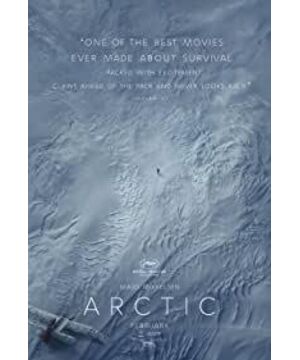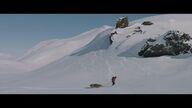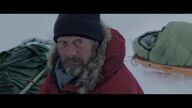Be cautious with spoilers
There are four unbearable bugs in detail:
1. Fortunately, the male protagonist made an emergency landing where he could catch fish (although the possibility is still high after all, the Arctic Circle).
2. In order to balance and increase the difficulty, the screenwriter did not provide compass and Garmin GPS for the heroes and heroines' planes (the two of them should be standard equipment for so many years in the deep outdoor. The most common mountain guide in Northern Europe has one man, and the heroine's scientific research helicopter. Actually not).
3. The equipment (clothes sleeping bag) is too thin. Under normal circumstances, a sleeping bag of this thickness can't hold up to -20 degrees. Especially when the heroine is still injured and unable to move, her limbs should freeze out after being dragged outside for a day. The male lead's pair of black ice gloves can also withstand the toss. In addition, the heroine is really not broken.
4. It is still a problem of equipment. Survival whistle should also be a must-have outdoors. Some down jackets should be equipped with an inner pocket. After the hero finally saw the distant person, there was no whistle, but he could only blow off the flare. It was too uncomfortable to watch.
Other aircraft models, polar bears, etc. are acceptable for the existence of the plot, after all, there are surprises everywhere outdoors.
There is no plot, no dialogue, no highlights, and even no reversal in this film. But that's the case with real outdoor survival.
The safest way after a disaster is to send a signal to wait for rescue. The male protagonist walks to the top of the mountain by telling the time on his watch every day, shaking the signal mechanically for a day for help, and then returning to the cabin by telling the time by the watch. Repeating this, his facial expressions gradually become dull, sluggish, and desperate. But persist. In order to save the female protagonist who was "injured and unconscious in order to save herself", the male protagonist packs up equipment and heads to the shelter of unknown danger (seasonal), which is not only courage, but also responsibility and humanitarianism. Under the sudden emergence of a cliff, the male protagonist tried to drag the female protagonist over and failed, hovering several times on the edge of abandoning the wounded, and finally resolutely crossed the route and changed to a route full of more unknowns and longer time, which turned into an understatement. "We'll take a better way".
The male protagonist repeated "It's ok", "you're not alone", and "they will come tomorrow" "or the day after" to the unconscious female protagonist several times. It is true that she is encouraging the heroine (even if the other party is in a coma, I don't know if she can hear it), so why not try to suggest herself and stick to it. The reason that pokes me the most is that an outdoor person really encourages his teammates when they are almost unable to hold on. From my guide to encourage me, to now I encourage my own teammates, the phrase "It's ok" ", you're not alone" took me back to the mountains and middle fields in an instant. When those who were about to be unable to go down and were about to give up, they could make the whole journey by repeating these two simple words.
The scene where the polar bear enters the cave is the most realistic. Even though the audience may prefer the male protagonist to give the bear a hammer, it is difficult for any ordinary person to kill a living creature either psychologically or physically, and it is the most true response to drive it away.
The female protagonist’s wound worsened, and the male protagonist decided to abandon her and leave. He walked backwards, was attracted by the flowers, was in a daze, and then fell into the hole. Everything happened so suddenly and naturally. He had to concentrate all the time in the wild. It is very true that it is possible to twist to the point of falling when you walk.
The last point that poked me was the episode where the hero fell into the hole. He fell into a faint and found his leg stuck in the stone after waking up. The male protagonist exhausted his strength and collapsed helplessly on the ground after trying several times without pulling out his leg. He smiled unbelievably, "My tm leg." Really can’t get out? Impossible, isn’t it too funny” and then quickly turned into a painful groan, the light from the hole on his face was like “wc, I’m not really going to die here, how can I do it in a hurry? "Wait", tears flowed, eyes reunited, "No way, I must go out alive", and then started pulling my legs again. This period of acting from 1 hour and 14 minutes later is simply amazing. Once I was sliding on wild snow in the mountains and hit a rock. I was dizzy at first. I opened my eyes and found that because the snowboard detacher didn't work, it was stuck in the rock, and the knee of my left leg was twisted 90 degrees down. In the subsequent process, experiencing the physical reaction is exactly the same as the male protagonist’s performance in the movie. I wonder if the actor specifically experienced a twisted leg for acting (◐‿◑).
This film and movies such as "Survival in the Wild" are not in the same route, and are mainly documentary (except for the several obvious bugs mentioned above). An ordinary person's survival in the polar regions is simple, true, and pure, without technical science, and without being possessed by the master.
View more about Arctic reviews









